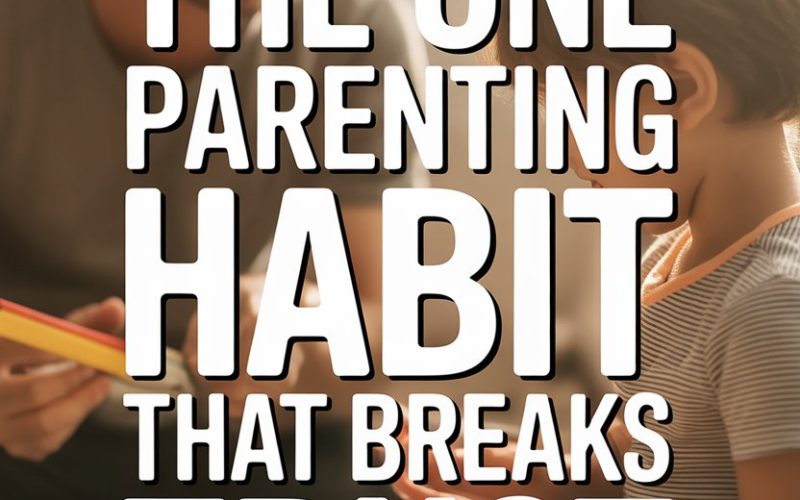Little feet patter down the hallway. You hear the whispered secrets, the giggles, the questions that come at you faster than you can answer.
Parenting is a wild ride, full of moments that stretch your patience and test your mettle.
But nothing tests the foundation of your parent-child relationship quite like trust—and there’s one everyday habit that can chip away at it faster than you might think.
Promises, Promises
It starts innocently enough. “We’ll go for ice cream after your appointment, promise.” Or, “I’ll read you another story if you get your pyjamas on—cross my heart!”
You mean it in the moment. But life is busy, and bedtime creeps closer, the phone rings, someone spills milk on the dog (again).
Suddenly, you’re sliding into a quiet, “We’ll do it tomorrow,” hoping your little one will forget.
They don’t.
Repeatedly making promises and failing to follow through is the sneakiest trust-breaker in a parent’s toolkit.
On the surface, it might look like a harmless white lie—after all, aren’t we all just doing our best? But to a child, broken promises are huge.
They’re the cracks that can quietly spread, making your child question your word, your reliability, even your love.
Why Broken Promises Hit Hard
Youngsters are literal. If you say you’ll pick them up at 3:30, they’ll be watching the clock. When you say, “I’ll play after I finish this email,” your child is mentally counting the seconds.
For children, trust is built on simple, reliable cause and effect. You say it, it happens.
When those links break—over and over—they start to wonder: Can I count on Mum? Is Dad really going to show up? It’s not just about the missed ice cream.
Researchers point out that children whose parents consistently break promises or are unreliable are more likely to feel insecure and anxious, and may even start acting out or withdrawing.
It’s a slippery slope from “one more story tomorrow night” to a child who stops sharing their struggles, fearing you won’t be there in the ways that matter most.
Why Do Parents Slip?
Life doesn’t follow a script, and neither do children. Juggling work, chores, and the endless needs of small humans is a recipe for changing plans.
Sometimes you make a promise with the best intentions but are derailed by a late bus, a meltdown over broccoli, or a work call that just won’t end.
There’s also the small matter of wanting to keep the peace. It’s tempting to promise a treat or outing to head off a tantrum or smooth over a rough bedtime.
Sometimes, you just want a win.
Problem is, those little “parent fibs” add up. The more they’re used, the less your child believes your next promise, even the ones you fully intend to keep.
The Unseen Damage
Children are resilient, but they’re also observant. Repeatedly broken promises can slowly erode their sense of safety and self-worth.
According to child psychologist Dr. Laura Markham, children interpret broken promises as a sign that their needs and feelings aren’t important.
It doesn’t stop in childhood, either.
Experts from Harvard’s Center on the Developing Child explain that early trust issues can spill over into teenage years and adulthood, affecting friendships, romantic relationships, and even professional life.
Sounds dramatic? Maybe.
But think about the last time someone let you down. Now imagine that someone is your whole world.
Setting Realistic Expectations
Eager faces and big hopeful eyes make it tough to say no. Still, learning to set realistic expectations is the secret sauce to building trust.
It’s better to say “Maybe we can go to the park, let’s see how the weather looks after lunch,” than rashly promising a trip and then backtracking.
Resist the urge to overcommit, especially when you’re tired or distracted. If you’re not sure you can deliver, say so.
Children appreciate honesty, even when it’s not what they want to hear.
Give yourself a moment to think before promising. “Let me check my calendar,” or “I need to talk to Dad about that plan,” buys you time and models decision-making.
What To Do When You Slip Up
No one’s perfect. There will be days when you over-promise or forget—especially if you’re running on four hours of sleep and caffeine fumes.
When that happens, own it. A sincere apology (“I’m really sorry I said we’d go to the park and didn’t. I got distracted. I know that wasn’t fair to you”) goes a long way.
Resist the urge to heap on excuses; children know when you’re being evasive.
Making amends helps repair trust. Maybe you draw a park scene together, or let your child plan tomorrow’s outing.
The key is acknowledging their feelings, and showing you care about keeping your word.
Over time, these little acts of honesty and repair teach your child that trust isn’t about perfection, but about effort and respect.
Teaching Accountability By Example
Children learn by watching. If you make a habit of admitting your mistakes and working to fix them, you’re teaching a powerful lesson.
You might be surprised how forgiving a child can be when they feel heard and respected.
According to research on parent-child communication, kids who see their parents own up to slip-ups are more likely to do the same themselves.
This isn’t just about giving an apology, either. It’s about showing your child you’re human—and that being trustworthy sometimes means admitting when you get it wrong.
Avoiding the Empty Promise Trap
Sometimes, promises slip into your vocabulary by accident. “We’ll do it later” becomes a reflexive response, like saying “fine” to “How are you?” at the school gates.
If you catch yourself making vague promises, try swapping them for specifics. “We’ll try that game after dinner if there’s time” is more honest—and easier to deliver—than a blanket “We’ll do it later.”
If you know you’re a serial over-promiser, try posting a family calendar on the fridge.
Kids love to see their plans in writing, and you’ll have a visual reminder to help keep yourself honest (and maybe fewer sticky notes fluttering around the kitchen).
Building Trust in Small Moments
Trust isn’t built on grand gestures or once-in-a-lifetime trips to Disneyland. It grows in the everyday: the follow-through on little things, the bedtime chat you promised, the snack you said you’d pack.
Making space for connection—even small ones—shows your child they matter.
When you keep your word, even about “just one more book,” you’re teaching them that they can rely on you, no matter what life throws your way.
Missed the mark today? There’s always tomorrow.
The beautiful truth is, trust can be rebuilt, one bedtime story at a time.
The Takeaway You Can Use Tonight
Next time you’re tempted to promise a treat or outing—or even just one more Peppa Pig episode—pause for a beat. Check your energy, your to-do list, and your likelihood of actually following through.
If you’re not sure, be honest. Your child might protest, but they’ll learn that your word means something.
When you do make a promise (big or small), treat it as sacred.
And if you slip up, offer the repair—your child is watching, learning, and, most importantly, loving you all the same.
After all, trust isn’t about never getting it wrong. It’s about showing up, trying again, and proving—again and again—that you’re worth believing in.
Now, if you’ll excuse me, there’s a bedtime story I’ve been promising to read for the past three nights. Tonight’s the night.




